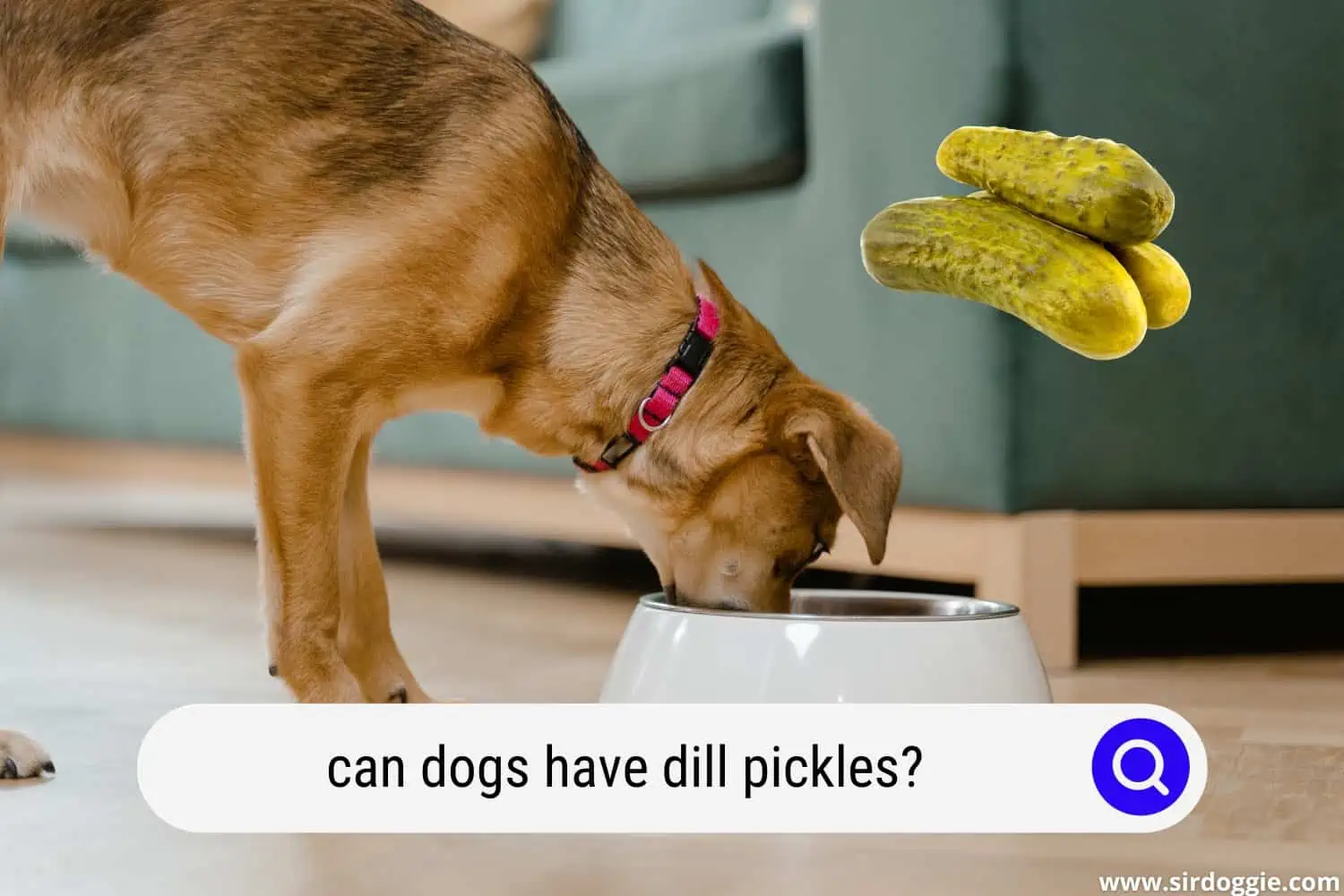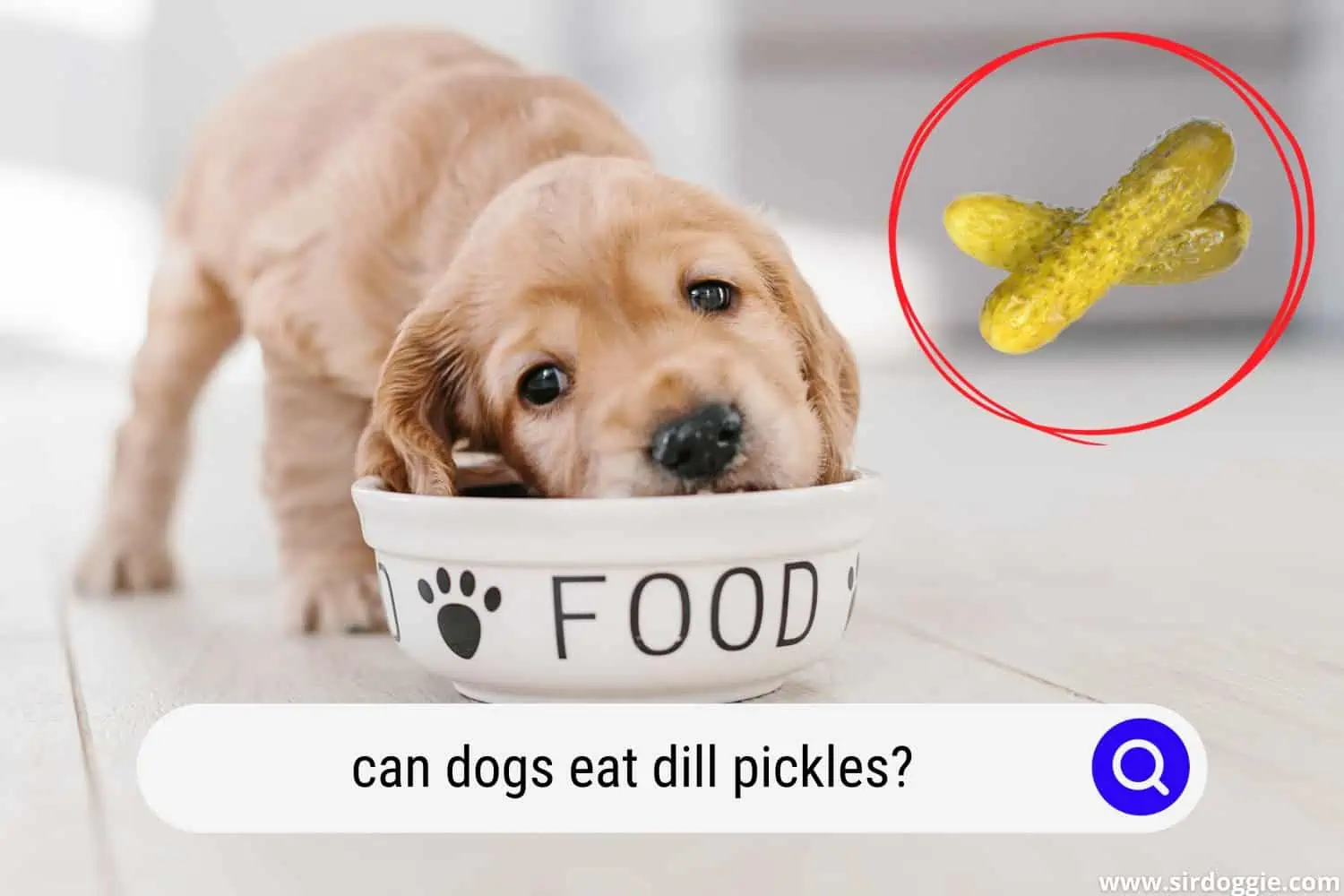Can Dogs Have Dill Pickles?
Can dogs have dill pickles? Is it safe for them to eat these? What about sweet pickles? This article will answer these questions. There are many things that dogs can eat that we eat but there are also many we eat that they should not. So what is the correct answer on dill pickles?

Can Dogs Eat Pickles In General?
Is there an issue for dogs with dill pickles or with all pickles? The answer is that maybe there are pickles safe for dogs. There are also pickles that are not safe for dogs. Let’s take a look at how a pickle becomes a pickle. Pickles are actually cucumbers that have been “pickled” in a brine.
A brine is very simply, a salt solution that is highly concentrated, placed in water. Brines can run from about 3 % salt solution to over 25%. Whether or not your dog can eat any kind of pickle depends not on the cucumber but on the brine. Some pickles will be ok for your dog to eat while others will not, depending on what spices are in the brine.
A brine could have toxic spices or too much sodium for your dog. They can be pretty acidic as well and be unhealthy for your dog.
Are Pickles Safe For Dogs
Some pickles are safe for dogs and some are not. For instance, can dogs have dill pickles? The answer is probably yes unless there are other spices and ingredients in the brine besides dill. To answer the question completely you have to know what is in the dill pickle brine. Pickles are in and of themselves just cucumbers. Cucumbers, though offering little nutritional value are safe for your dog.
Is dill safe for your dog? Yes, it is and it might actually be good for them. Therefore it depends on whether or not there is anything else in the brine besides salt and dill. Dill pickles have vinegar in the brine as well. Small amounts of vinegar are safe for your dog. So for the most part dill pickles would be safe.
However, there could be other ingredients in your dill pickle brine besides these three. For instance, there could be onions or onion powder. Onions are not good for dogs and can be terminally toxic.
Are Pickles Bad For Dogs
No, not necessarily, but some pickles will be bad for dogs. For instance, if there is garlic in the brine that would not be safe either. The same will be true for any kind of peppers. These ingredients in any form are toxic for dogs and garlic can be. Bread and Butter pickles usually contain onions and peppers.
The fact that the brine is very acidic disrupts your dog’s pH balance and can cause stomach and intestinal tract issues. It can also damage the kidneys. So you really want to be careful with any kind of “pickled” food and your dog.
There are other dangers as well. For instance, if you don’t make the pickles yourself they are likely to be filled with preservatives. High levels of sodium can cause dehydration or high blood pressure. Your dog gets all the sodium he needs from commercial dog food. Too much sodium can also be toxic.
Because excess sodium, acidic vinegar, and some herbs and spices can all be toxic, pickles can certainly be bad for dogs.

Read more about: Do Pugs Eyes Pop Out And Why
Can Dogs Eat Pickles
The answer to this question would seem to be a mixed bag. Can dogs have dill pickles? The answer to that seems to be “yes, but…”. Most pickles are not safe because of the brine, the spices, and the amount of sodium.
In addition to dehydration and blood pressure concerns, this can cause chronic pancreatitis. This is a painful condition that can be fatal as well. Having had a dog with chronic pancreatitis is not worth the risk in my mind. Then the vinegar can cause kidney issues and some spices or herbs are toxic.
So stay away from brines that are too salty, or use white vinegar. Other things to avoid include pickles made with garlic, onion, peppers, and especially Bread and Butter Pickles. Hemolytic anemia can be caused by onions and it is almost always fatal.
Can A Dog Have Dill Pickles
The answer to our original is yes, a dog can have dill pickles. In fact, pickles themselves have some positive benefits if you can avoid all the negative ones. Pickles are sometimes beneficial and dill pickles are particularly so. The benefits of dill include calming an upset stomach, improving digestion, helping dissipate respiratory issues, and preventing or stopping stomach cramps. The dill herb is very beneficial for nausea or gas. It has antioxidants that work to provide protection for your dog against free radicals. An unexpected and less serious benefit of dill is that it can keep your dog’s breath smelling fresh and sweet.
In and of itself the dill pickle has no nutritional value but it is safe. Dill by itself is even better in small doses. There is no pickling danger to worry about if you put a little dill in your dog’s food.
Should Dog’s Eat Pickles
Can dogs have dill pickles? Yes, they can. Should dogs have pickles at all? Not really. You can a lot of danger and no nutritional value from giving your dog a pickle. The exception to this is the pickle you make yourself. You will know exactly what is in it and use red wine vinegar instead of white. This will cut down on the acidic factor.
Your dog can eat dill pickles but if you must give them processed pickles, the best choice is a sweet pickle. The other choice for a commercial product would be a low sodium dill pickle. Just keep in mind that there is no health benefit in giving your dog a pickle. Are pickles safe for dogs? Some are. Are pickles good for dogs? Not really. Are pickles bad for dogs? They certainly can be.
Conclusion
If you absolutely have to give your dog a pickle, give them a very small piece of a sweet or dill pickle commercially made. You can also give them a small bite from the ones you made yourself. Don’t risk your dog’s health on a pickle you are not sure about.
Learn more about: Can Dogs Have Cauliflower Rice For Dinner

Family Dog Expert Author
Hi there! I’m Stuart, a devoted dog lover and family dog expert with over a decade of experience working with our furry companions. My passion for dogs drives me to share my knowledge and expertise, helping families build strong, loving bonds with their four-legged friends. When I’m not writing for SirDoggie, you’ll find me hiking, playing with my beautiful dog, or studying music.